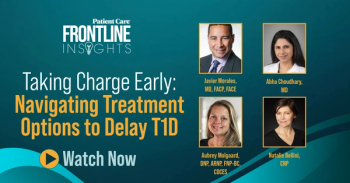
Panelists highlight the burden of type 1 diabetes including the significant physical, emotional, and financial challenges faced by patients and their families, emphasizing the need for early intervention and proactive management strategies.

Panelists highlight the burden of type 1 diabetes including the significant physical, emotional, and financial challenges faced by patients and their families, emphasizing the need for early intervention and proactive management strategies.

Panelists discuss how delaying intervention between stage II and stage III T1D can result in irreversible β-cell loss, higher rates of complications, and poorer overall outcomes for patients.

Panelists discuss how understanding the stages of type 1 diabetes (T1D) progression is crucial for early intervention, with a focus on delaying disease advancement through proactive treatments like teplizumab.

Panelists discuss how delaying intervention in stage 2 T1D can lead to faster disease progression, increased risk of complications like diabetic ketoacidosis, and greater long-term burden on patient health and quality of life.

Panelists discuss how antibody screening for type 1 diabetes can identify at-risk individuals early, enabling proactive monitoring and intervention to delay or prevent disease onset.

Panelists discuss how teplizumab therapy can delay the onset and progression of type 1 diabetes (T1D) by preserving β-cell function and reducing the risk of developing full-blown diabetes in at-risk individuals.

Panelists discuss clinical use of teplizumab including patient selection, navigating approval processes, and managing the 14-day infusion regimen to optimize outcomes and delay the progression of type 1 diabetes.